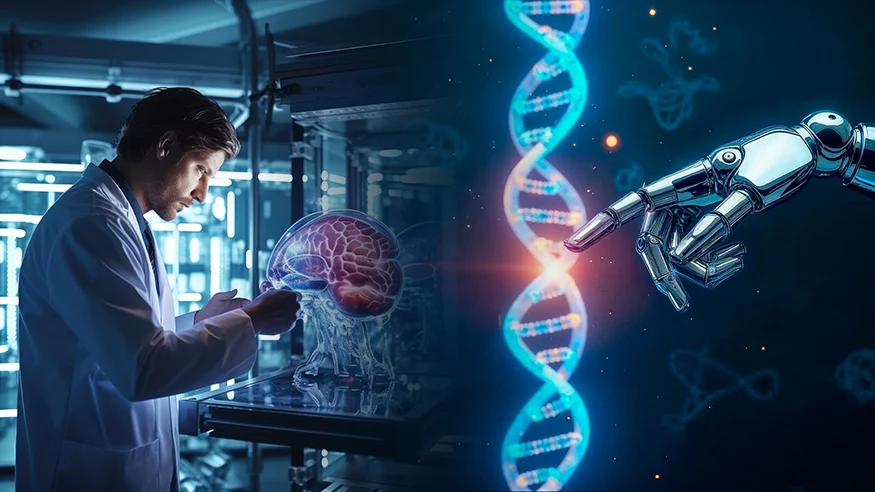15 Popular Machine Learning Courses for Beginners in 2026

If you have ever wondered how Netflix recommends your favorite show or how self-driving cars make split-second choices, this is the universe of machine learning. 2026 is the year that learning this skill becomes no longer optional but compulsory. As a student, a tech enthusiast, or someone aiming to switch careers, enrolling in a machine learning course can be your golden key to the future.
There are so many platforms that offer the best machine learning courses that choosing one becomes too daunting. Fear not, this guide sifts the top choices out from the bunch to help you start your journey. If you desire a course of machine learning with real projects that can fit around your schedule, we’ve got you covered.
What is Machine Learning?
In short terms, Machine Learning (ML) is the study of how to program computers to learn and make decisions without having ever been programmed. Artificial intelligence is the root of this. Just think this way; instead of having to spell out to a computer step-by-step how to act, you give the computer data, and the computer learns to recognize things on its own.
Wondering how does machine learning work? Well, it works by building machine learning models that can identify patterns in data. These models improve with time as they are exposed to more data. From detecting fraud in banking systems to diagnosing diseases in healthcare, ML is everywhere.
In 2026, major industries will be driven by ML. Healthcare applies it to medical images, banking applies it to credit scores, and the tech industry applies it to predictive analysis. As per the tech professionals, more than 80% of companies are now incorporating ML-based tools within day-to-day activities.
Then, no matter your aspiration to be an ML engineer, data analyst, or researcher, this is the best time to start.
Expert Take: According to STX Next’s roundup of experts, they assert that the domain of machine learning is changing fast. Dr. Stylianos Kampakis, a renowned data scientist and founder of The Tesseract Academy, said that “machine learning grows so fast. Six months of progress here equals six years in any other field!” This comment reflects just how fast and innovation-driven the machine learning area is becoming in 2026.
Why Learn Machine Learning?
According to Mark Cuban, a famous American entrepreneur and venture capitalist, “No matter what you’re doing – AI, deep learning, or ML – you should learn it properly. As otherwise you will be a dinosaur within the next 3 years.”
Machine learning is no longer a day-to-day buzzword – it’s the wave of the future of work. Every industry, ranging from e-commerce to energy, is dependent on ML-driven automation and data intelligence today. Demand for such professionals with ML skills has gone to the number one position, where companies are willing to pay top dollar for the deserving candidate.
There are simply only so many 2026 machine learning jobs. These sought-after careers, such as data scientist, AI analyst, and ML Engineer, are among the fastest-growing IT careers. The Bureau of Labor projects a 23% growth in machine learning engineering jobs by 2032.
Many well-distinguished platforms like Coursera, edX, etc. offer excellent machine learning classes to further your education.
If you are interested in learning how to be a machine learning engineer, the process usually entails learning the basics of ML algorithms, Python coding, and hands-on projects. No Ph.D. is needed, but curiosity, self-motivation, and quality study materials will do.
The good news? Non-coding individuals can now join this field. Platforms are launching guided lessons, easy-to-get-started challenges, and mentorship to help you transition.
15 Best Machine Learning Courses for Beginners (2026 Edition)
You should take some simple machine learning classes to keep AI from taking a toll on your future. These classes will help you learn the most important things, develop models that work in the real world, and give you an edge over your competition. So, go ahead and get started!
1. Coursera — Machine Learning Specialization
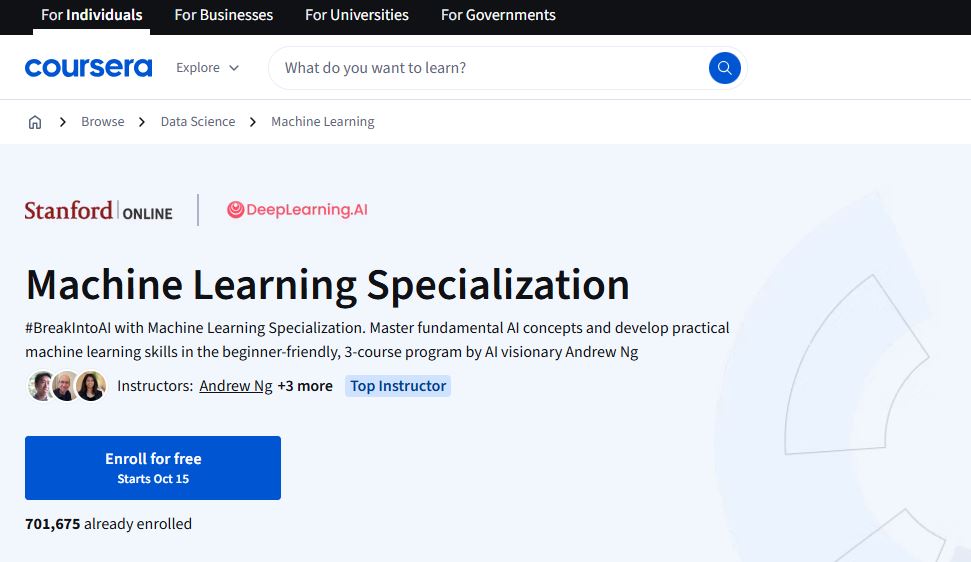
Image Credit: Coursera
Anyone who is new to machine learning will benefit from this Stanford University machine learning course. It basically teaches the basics of machine learning for beginners like supervised and unsupervised learning. You will learn how to utilize Python, TensorFlow, NumPy, and scikit-learn to build machine learning programs that work in the real world.
Course Highlights:
- Made by DeepLearning.AI and Stanford Online
- Andrew Ng, a pioneer in AI, taught it.
- A new version of the original ML course that 4.8 million individuals took
- Using Python and TensorFlow to make AI work in the real world
Skills You Will Learn:
- Learning with and without supervision
- Feature engineering and model evaluation
- Neural networks (using TensorFlow)
- Decision trees and random forests
- Recommender systems
- Responsible AI and data ethics
| Platform | Coursera (Stanford + DeepLearning.AI) |
| Instructor name | Andrew Ng, Geoff Ladwig, Aarti Bagul, and Eddy Shyu |
|
Duration |
Approx. 2 months |
|
Level |
Beginner |
| Free/Paid | Free to audit (Paid for certificate) |
| Ratings | 4.8 |
2. IBM — Machine Learning with Python
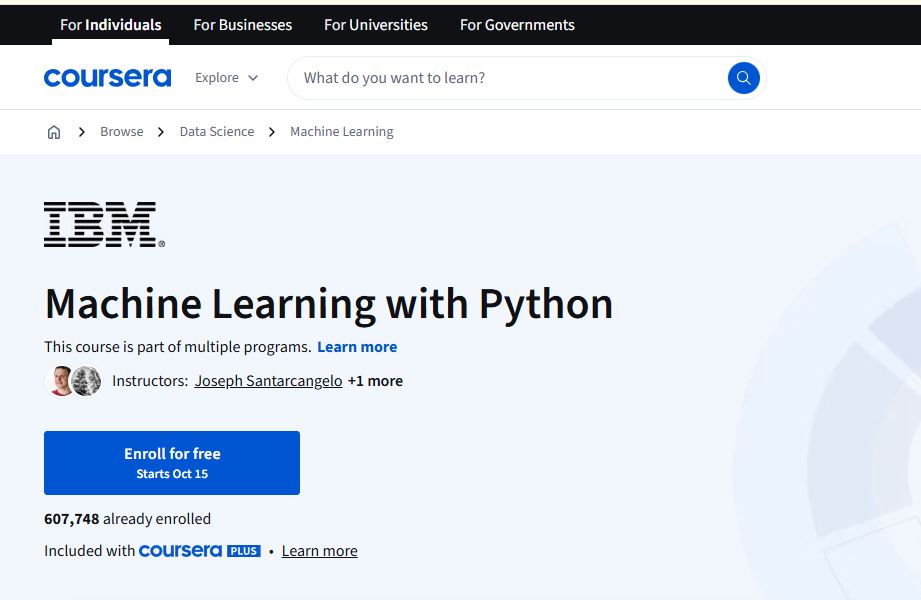
Image Credit: Coursera
You will learn how to utilize Python to do simple machine learning tasks in this class. There are a lot of things that can be done, like regression, classification, grouping, and lowering the number of dimensions. It’s one of the best courses in machine learning for Python-based learning.
Course Highlights:
- Six well-planned courses that teach everything from the beginnings of machine learning to more advanced topics
- Labs and real-world projects that use Python and scikit-learn
- A schedule that lets you learn at your own pace
- Extensive accessibility. It’s a part of a number of IBM-affiliated programs
Skills You Will Learn:
- Use regression (linear and logistic) and classification algorithms.
- Clustering and reducing the number of dimensions (PCA, t-SNE, UMAP)
- Evaluating models, cross-validating them, and regularizing them
- Feature engineering and preprocessing
- Programming in Python and using scikit-learn
- Statistical modeling and predictive analytics
| Platform | Coursera (IBM) |
| Instructor name | Joseph Santarcangelo and Jeff Grossman |
| Duration | 2 weeks |
| Level | Intermediate |
| Free/Paid | Enroll for free (paid for certificate) |
| Ratings | 4.8 |
3. University of Washington — Machine Learning Specialization
This specialization develops your ability to build intelligent applications using machine learning techniques. You’ll learn to analyze complex data, make predictions, classify, cluster, and create systems that improve with experience.
Course Highlights:
- Case study–driven approach to teach real ML workflows
- Four hands-on courses covering key ML domains
- Progressive complexity: prediction → clustering → retrieval
Skills You Will Learn:
- Regression & predictive modeling
- Classification techniques
- Clustering and unsupervised methods
- Information retrieval techniques
- Feature engineering & statistical modeling
- Bayesian statistics & ML algorithms
|
Platform |
Coursera (University of Washington) |
| Instructor(s) |
Emily Fox, Carlos Guestrin |
|
Duration |
2 months |
|
Level |
Intermediate |
|
Free/Paid |
Enroll for free (paid certificate option) |
| Ratings | 4.7 |
4. Udemy — Machine Learning A‑Z: AI, Python & R + ChatGPT Prize [2026]
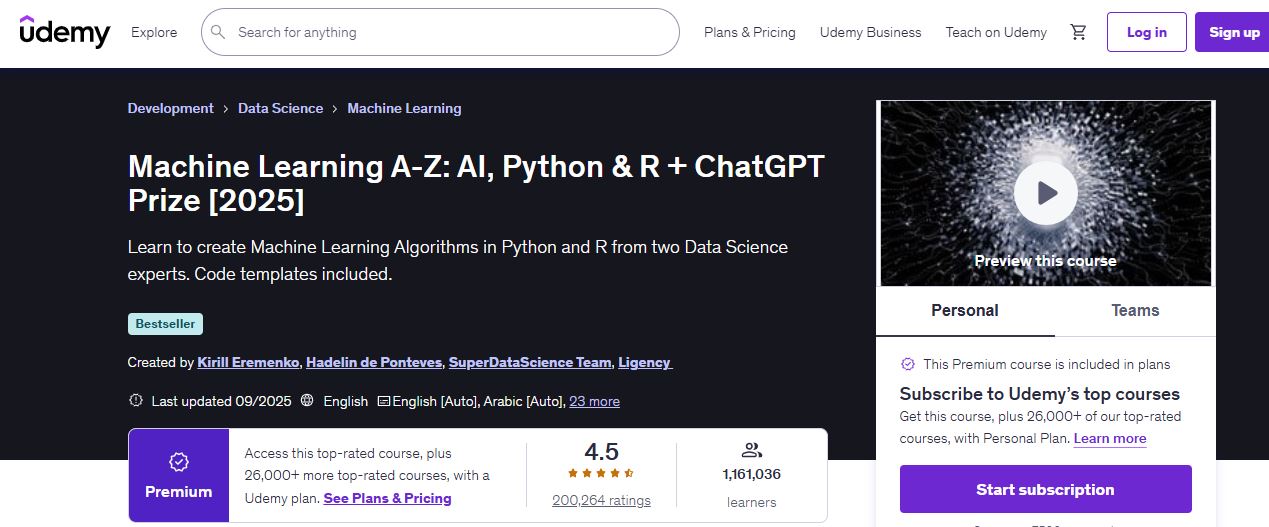
Image Credit: Udemy
In this course, you will learn how to construct and apply machine learning models in both R and Python. This is one of the best ML courses for both – those who are new to it and those who have done it before.
Course Highlights:
- More than 42.5 hours of on-demand video content
- Covers advanced topics including NLP, deep learning, and reinforcement learning
- Comes with downloadable code templates in both Python and R
- Highly rated among Udemy machine learning programs
Skills You Will Learn:
- Use regression and classification algorithms
- Use clustering and unsupervised learning
- Build deep learning architectures (ANN, CNN)
- Use reinforcement learning (UCB, Thompson sampling)
- Choose the best model, cross-validate it, boost it, and grid search it
- Make robust ML models and put them together
| Platform | Udemy |
|
Instructor(s) |
Kirill Eremenko, Hadelin de Ponteves, SuperDataScience Team, Ligency |
|
Duration |
42.5 hours |
|
Level |
Beginner |
| Free/Paid |
Paid course (frequent discounts available) |
| Rating | 4.5 |
5. DeepLearning.AI — Machine Learning in Production
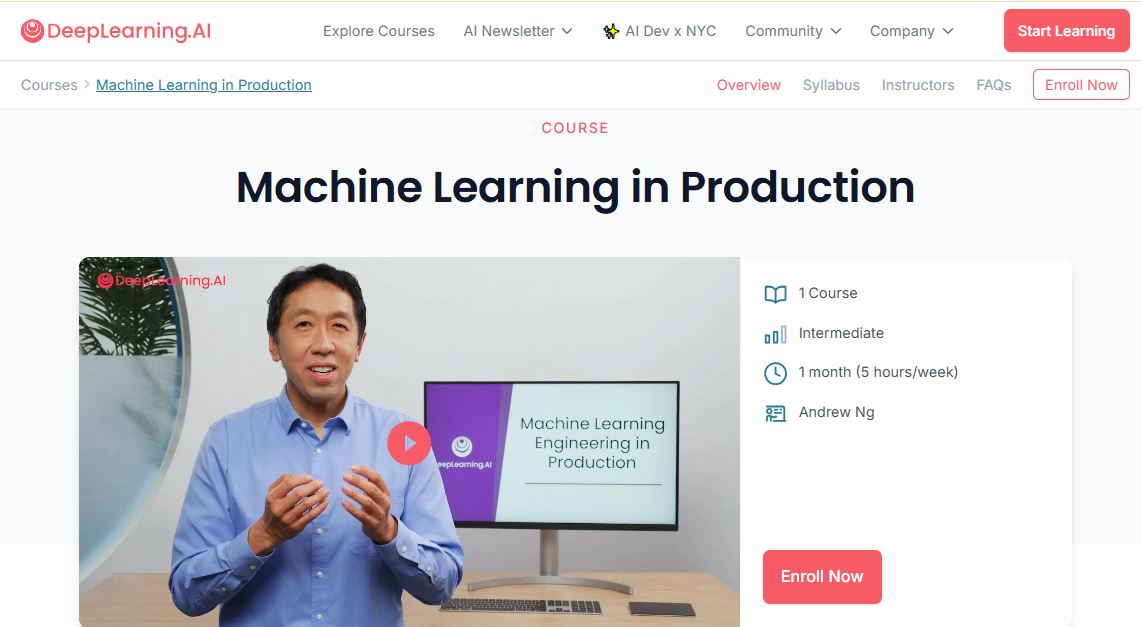
Image Credit: DeepLearning.AI
This training will help you link the building and use of models. The Andrew Ng Machine Learning course makes you equipped to utilize models in real life with confidence.
Course Highlights:
- Covers the complete ML production lifecycle, from scope to deployment
- Teaches how to handle drift, review data, and define performance baselines
- A way to keep getting better and make pipelines
- Helps you learn about MLOps and production engineering through hands-on experience
Skills You Will Learn:
- How to build ML production systems from the ground up
- Data, model, and deployment pipelines
- Dealing with idea drift and keeping an eye on model performance
- Setting baselines and performance targets at the human level
- MLOps and system performance analysis
|
Platform |
DeepLearning.AI |
|
Instructor(s) |
Andrew Ng |
|
Duration |
1 month |
|
Level |
Beginner |
|
Free/Paid |
Free to audit (Paid certificate available) |
|
Rating |
4.5 |
6. Kaggle — Intro to Machine Learning
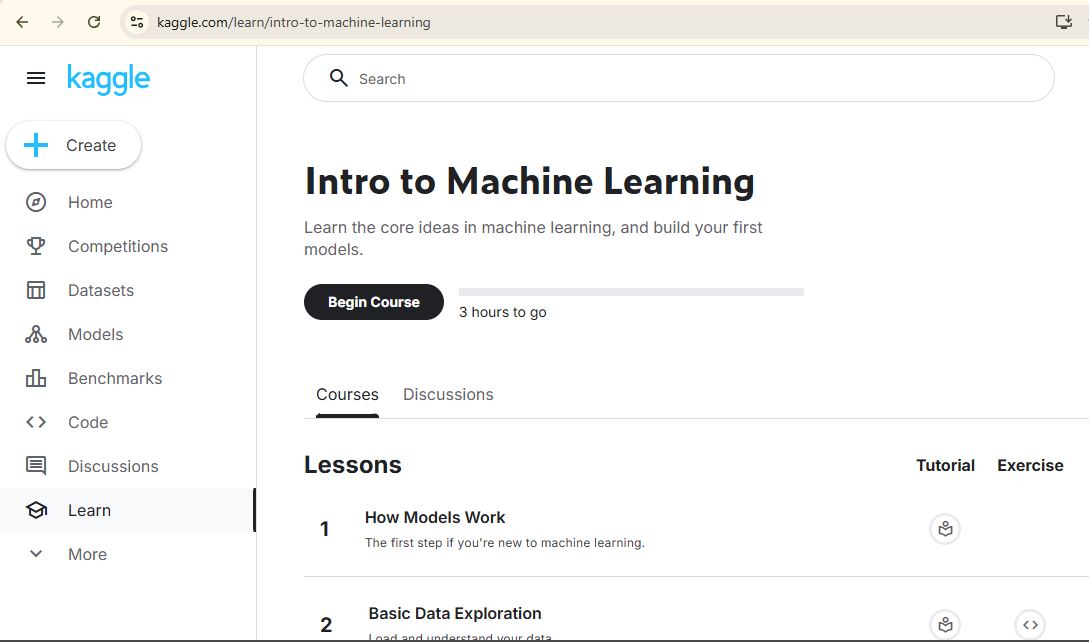
Image Credit: Kaggle
This session will teach you the principles of machine learning and help you create your first prediction models. It is an excellent place to start before you go on to more advanced technologies.
Course Highlights:
- Seven lessons for novices, covering everything from the basics of models to random forests
- Coding tutorials and activities with hands-on help
- A structure that is adaptable and changes from lesson to lesson
- Free admission and the chance to acquire a certificate
Skills You Will Learn:
- How to make your first ML models
- How to look at data and figure out what features are important
- How to check and compare models
- How to keep from fitting too much or too little
- How to find out how well a model performs
|
Platform |
Kaggle |
|
Instructor |
Dan Becker |
|
Duration |
3 hours |
|
Level |
Beginner |
|
Free/Paid |
Free |
|
Rating |
4.5 |
7. Simplilearn — Free Machine Learning Course Online with Certificate
You’ll learn how to apply key ML methods, build models, and use them in the real world. You’ll obtain a machine learning certification when you’re done!
Course Highlights:
- Teaches supervised and unsupervised learning, regression, classification, and clustering
- Covers techniques including boosting, bagging, and the principles of deep learning
- Gives a free completion certificate
Skills You Will Learn:
- Principles of deep learning
- Supervised and unsupervised learning
- Linear and logistic regression
- K-means clustering
- Decision trees and random forests
- Ensemble methods like boosting and bagging.
| Platform | Simplilearn |
|
Instructor(s) |
Simplilearn |
|
Level |
Intermediate |
|
Duration |
3 months |
| Free/Paid | Free (certificate included) |
|
Rating |
4.5 |
8. DataCamp — Machine Learning Fundamentals in Python
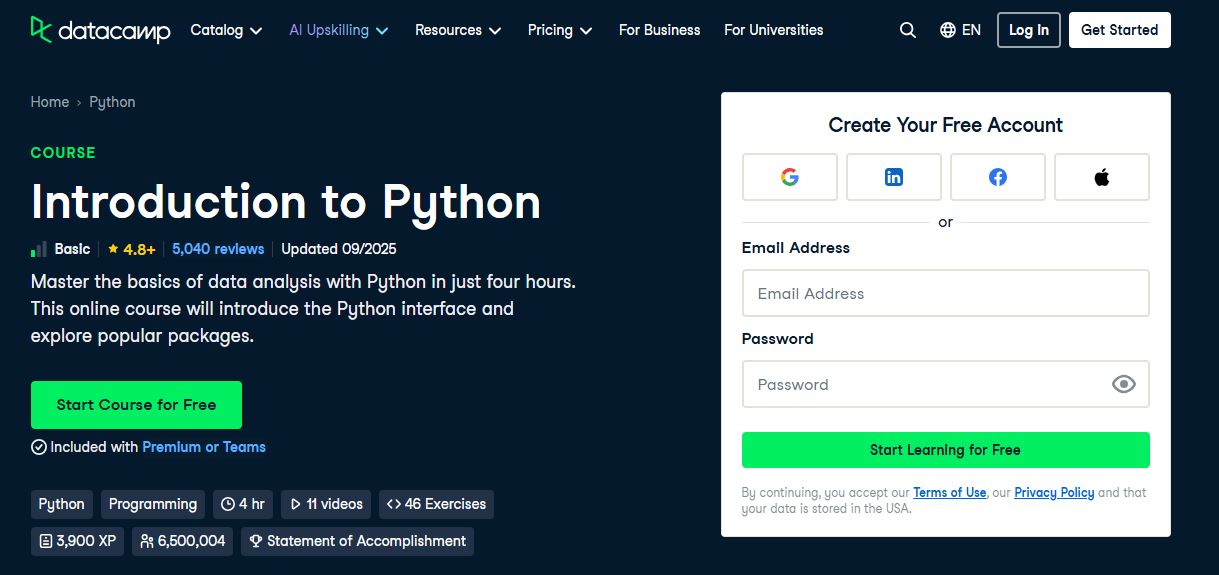
Image Credit: DataCamp
It’s indeed the best machine learning certification course! As one of the advanced Datacamp Machine Learning courses, it will help you work with real datasets. You will also learn classification/regression, clustering, neural networks, and reinforcement learning.
Course Highlights:
- Covers supervised learning, unsupervised learning, and reinforcement learning
- Hands-on with Python libraries like Scikit‑learn, scipy, and PyTorch
- Modular design: you can progress lesson by lesson
- Completion certificate is included as a part of the track
Skills You Will Learn:
- Supervised learning & regression models
- Classification techniques
- Clustering and dimensionality reduction
- Neural networks & basic deep learning
- Reinforcement learning fundamentals
- Working with Scikit‑Learn & PyTorch
| Platform | DataCamp |
|
Instructor(s) |
Benjamin Wilson, George Boorman, Jasmin Ludolf, Thomas Hossler and Fouad Trad |
|
Duration |
16 hours |
|
Level |
Beginner |
|
Free/Paid |
Included with Premium or Teams subscription |
|
Rating |
4.5 |
9. Google AI Education — Machine Learning Crash Course
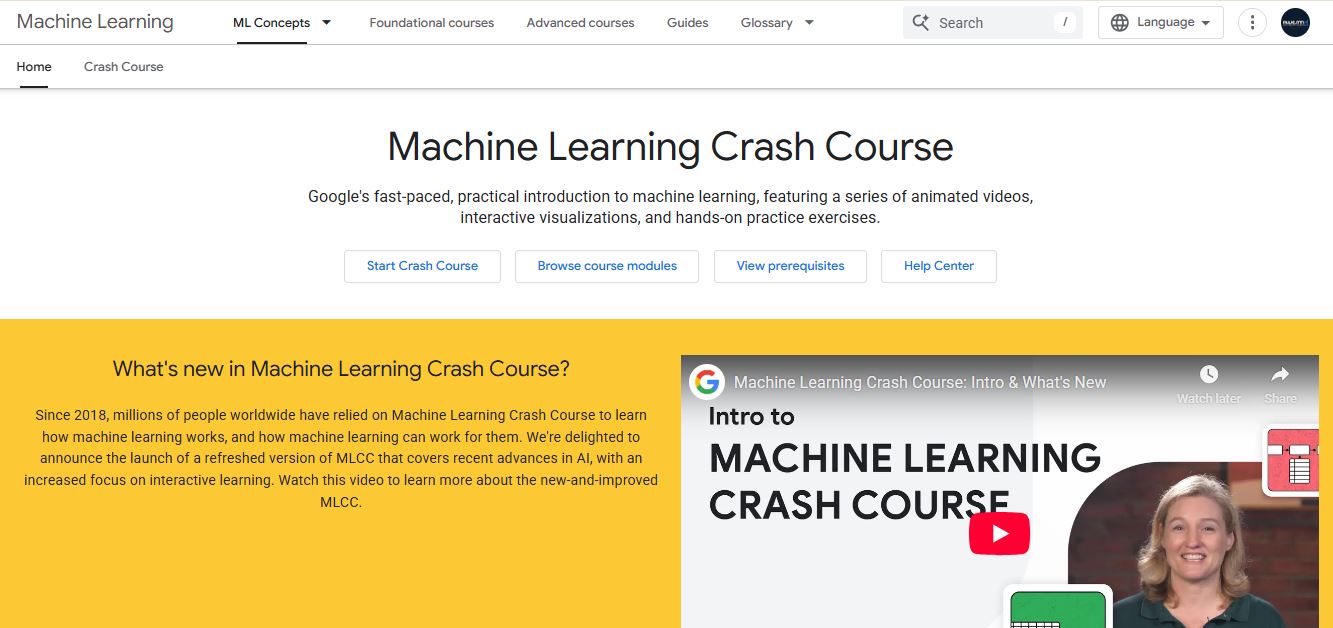
Image Credit: Google AI Education
You’ll learn regression, classification, neural networks, and deployment concepts – all through hands-on modules as part of a Coursera ML course‑style learning experience with Google’s MLCC.
Course Highlights:
- Modules cover linear regression, logistic regression, classification, and more
- Data handling: numerical, categorical, generalization, overfitting
- Advanced topics: neural networks, embeddings, large language models, AutoML, fairness
- Real‑world ML system and production insights
Skills You Will Learn:
- Regression and classification modeling
- Data preprocessing for numerical & categorical data
- Overfitting vs generalization strategies
- Neural network fundamentals & embeddings
- Building production ML systems
| Platform | Google AI Education |
|
Instructor(s) |
Google’s engineering team |
|
Duration |
15 hours |
|
Level |
Intermediate |
| Free/Paid |
Free (no cost) |
|
Rating |
4.5 |
10. Edx — Introduction to Machine Learning on AWS
This course will show you AWS features that make machine learning work easier. You’ll learn about computer vision, data extraction, language processing, model training, and deployment, all of which will help you become ready for AWS ML certification prospects.
Course Highlights:
- Working with AWS ML services like Rekognition, Textract, Comprehend, Translate, Lex, and SageMaker
- Doing things like analyzing images, recognizing speech, translating languages, and creating virtual agents
- Has a paid certificate track and a free audit track
Skills You Will Learn:
- Using AWS managed services to apply ML/AI
- Labeling data and classifying images and text
- Training and hosting models using SageMaker
- Natural language processing and translation, speech recognition, and virtual agents
| Platform | Edx |
|
Instructor |
Russell Sayers |
|
Duration |
3 hours |
|
Level |
Intermediate |
|
Free/Paid |
Audit track free, verified certificate track paid |
| Rating | 4.5 |
11. Codecademy — Data Scientist: Machine Learning Specialist
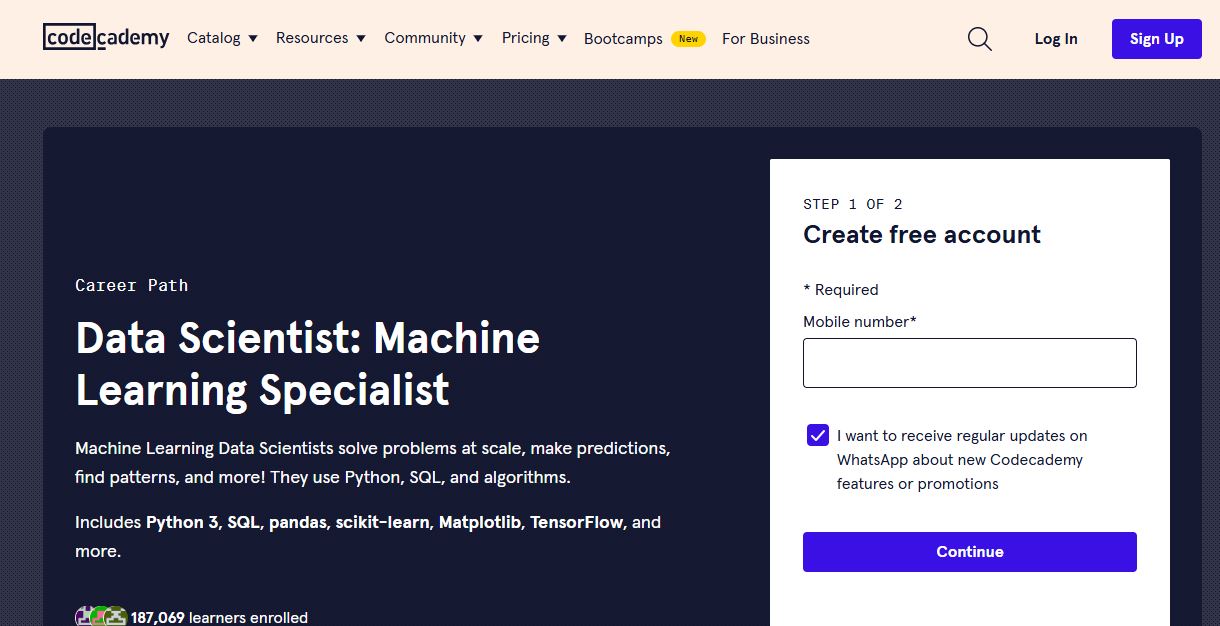
Image Credit: Codecademy
This class will help you learn the technical and analytical abilities you need to make decisions based on data. The Career Path establishes a strong foundation that goes well with advanced certifications like the Google Professional Machine Learning Engineer Certification, even though it focuses on practical, job-ready training.
Course Highlights:
- 27 units, 81 lessons, 59 projects, and 58 quizzes make up the structured learning path.
- The course covers Python, SQL, pandas, scikit-learn, Matplotlib, and TensorFlow.
- You can build a professional portfolio with hands-on projects.
- There is a job-readiness checker and an AI-powered interview simulator.
- You can get a professional certification when you finish the course.
Skills You Will Learn:
- How to use Python and SQL to analyze data
- How to visualize data and interpret statistics
- How to build and test machine learning models
- How to work with TensorFlow for neural networks
|
Platform |
codecademy |
|
Instructor |
codecademy |
|
Duration |
95 hours |
|
Level |
Beginner |
|
Free/Paid |
Paid (Pro) |
|
Rating |
4.5 |
12. Udacity — AWS Machine Learning Foundations
This class teaches the basics of machine learning. It discusses supervised and unsupervised learning, training models, and testing them. Students learn about more complex areas like computer vision, reinforcement learning, and generative AI. It gives you a solid base that you can use to get credentials like the Google ML Engineer Certification.
Course Highlights:
- Learn the basics of ML
- Explore supervised and unsupervised learning
- Learn about computer vision and generative AI
- Build and deploy ML models with SageMaker
- Get professional feedback on your projects
Skills You Will Learn:
- How to use AWS ML tools well
- How to train and deploy models
- How to use generative adversarial networks (GANs)
- How to use deep autoregressive networks
- How to use reinforcement learning (value-based and model-based)
|
Platform |
Udacity |
|
Instructor |
Udacity Experts Team |
|
Duration |
11 hours |
|
Level |
Beginner |
| Free/Paid |
Free |
|
Rating |
4.5 |
13. LinkedIn Learning — Artificial Intelligence Foundations: Machine Learning
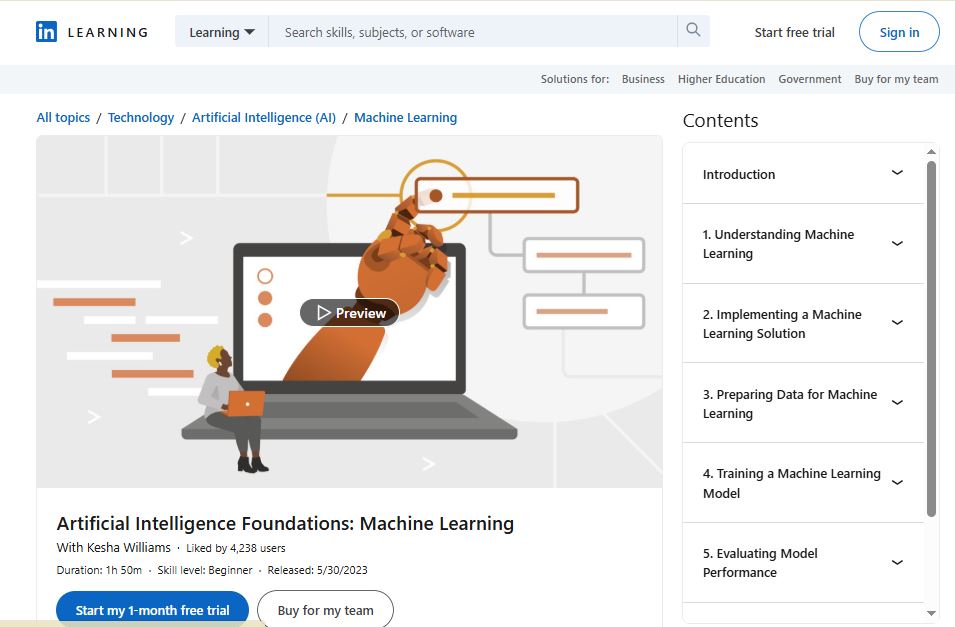
Image Credit: LinkedIn Learning
This class teaches you the basics of machine learning. The course also teaches you how to design a full machine learning pipeline. This skill is important for both AI jobs and people who want to get Google ML engineer certification.
Course Highlights:
- Teaches supervised, unsupervised, and reinforcement learning
- Includes data preparation and algorithm selection
- Teaches how to train and evaluate models
- Shows how to design end-to-end ML pipelines
Skills You Will Learn:
- Use machine learning throughout its lifecycle
- Choose the right ML algorithm
- Find and clean data
- Create and improve pipelines
|
Platform |
LinkedIn Learning |
|
Instructor |
Kesha Williams |
|
Duration |
2 hours |
|
Level |
Beginner |
| Free/Paid |
Free with Trial / Paid |
|
Rating |
4.7 |
14. Edx — Data Science: Building Machine Learning Models
This class on machine learning teaches you how to use data to make models that predict what will happen. You will learn about machine learning techniques, regularization, cross-validation, and how to make a system that suggests movies to you.
Course Highlights:
- Teaches common ML techniques and principal component analysis
- Builds a recommendation system as a project
- Covers regularization and cross-validation to avoid overfitting
- A part of a curriculum that gives you a professional certificate
Skills You Will Learn:
- Use ML algorithms
- Cross-validation and overfitting mitigation
- Regularization approaches
- Build recommendation systems
- Choose and tune algorithms
|
Platform |
Edx |
|
Instructor |
Rafael Irizarry |
|
Duration |
8 weeks |
|
Level |
Beginner |
| Free/Paid |
Audit for free / Certificate for $149 |
|
Rating |
4.5 |
15. W3School — Machine Learning
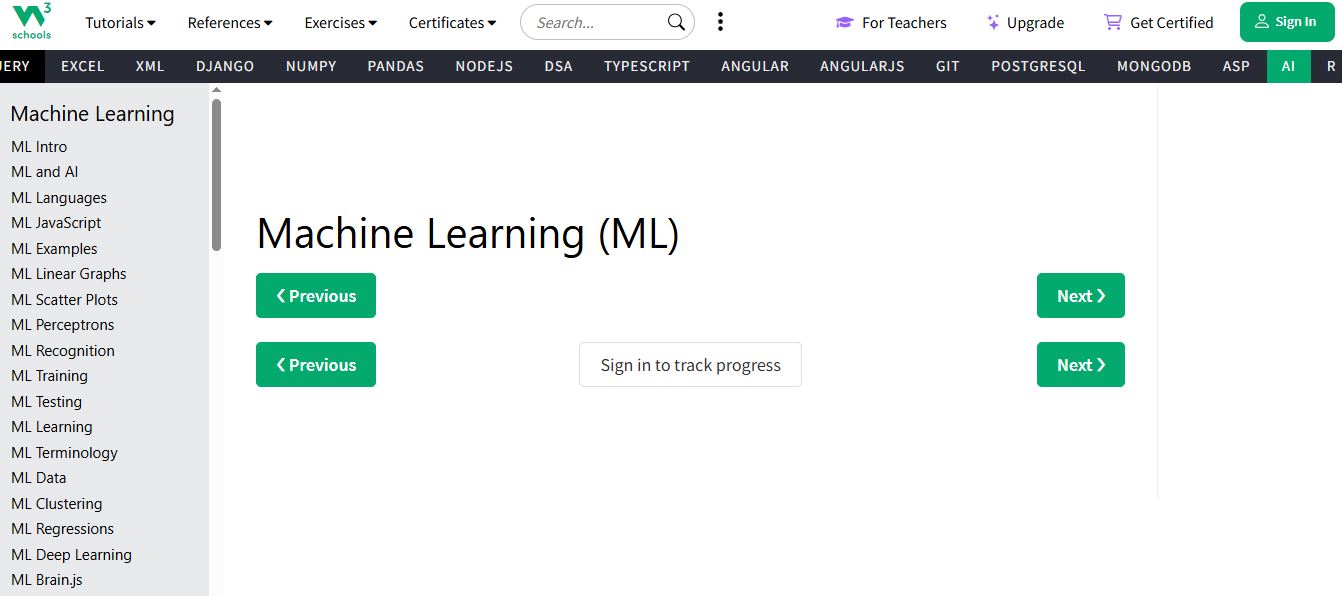
Image Credit: W3School
This course teaches the basics of machine learning, which is a branch of artificial intelligence. You will learn about neural networks, perceptrons, deep learning, and how these technologies make modern AI systems work. The course gives you the basic knowledge you need to understand the main ideas of ML and move on to complete machine learning online courses.
Course Highlights:
- How AI has changed over time to become Deep Learning
- The differences between traditional programming and machine learning
- Introduces perceptrons and neural networks
- Shows the structure of multi-layer and deep neural networks
- Highlights how deep learning makes advanced AI applications possible.
Skills You Will Learn:
- The main ideas behind neural networks
- How to build and train perceptrons
- How to understand multi-layer neural networks
- The basics of deep learning for challenging problems
|
Platform |
W3School |
|
Instructor |
W3School |
| Duration |
6 hours |
|
Level |
Beginner |
|
Free/Paid |
Free |
|
Rating |
4.5 |
Read Also: Best Chatgpt courses
Factors to Consider Before Choosing a Machine Learning Course
It is often difficult to choose the appropriate course in ML with the abundance of web-based courses. To help you make the best decision, below are the five most significant things to consider:
- Balance between Theoretical and Practical Aspects: Opt for a course that connects fundamentals to projects. The best machine learning course will not only teach you why but also how.
- Professional Teachers: To get the best learning experience, always choose teachers with hands-on experience in AI or data science.
- Recognized Certification: A machine learning certificate from a recognized portal like Coursera, edX, or Udemy will increase your employability.
- Hands-on Projects: Choose courses that allow you to develop actual models or case studies. This is where you actually learn.
- Platform Credibility: Check the course ratings and feedback from students. Highly rated courses tend to add new content and effective student support.
Key Benefits of Pursuing a Machine Learning Course
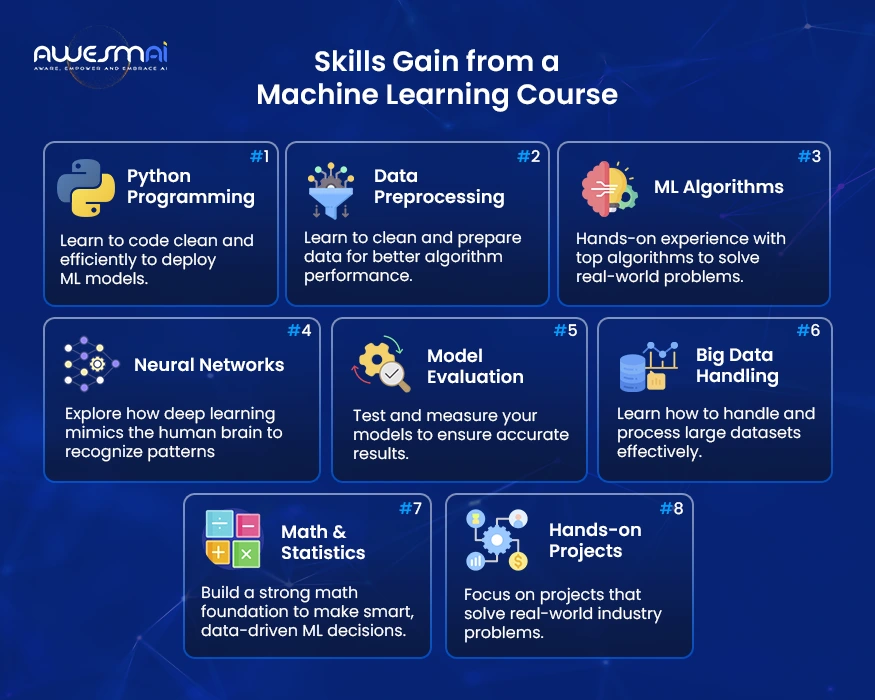
Lessons from an online ML class do not impart raw coding skills; they prepare you with the mindset of a data-solving professional. The best aspects that can be pointed out in favor of the course are as follows:
- Career-Ready Competence: You gain hands-on exposure to real industry problems, so you’re able to work on industry-level projects right from the first day.
- Improved Job Prospects: You can actually stand out with a machine learning certification. Employers want individuals who know they can implement ML in real-world situations. That certificate proves you are up for the challenges, and it’s much more likely to get you a good job.
- Learn by Doing: The greatest way to get ML is by doing it. Projects and exercises allow you to see things happen in real life. You don’t memorize; you actually learn how to create and test the models yourself.
- Advice from Real Experts: Many courses invite people who operate in ML daily. They give their experience, advice, and insights. Such advice keeps you from making usual mistakes and lets you observe what actually works in the industry.
- See the Real Impact: After beginning work on ML, you come to understand how much is involved in daily life. From suggesting the next thing to watch to making business decisions automated, ML is present all around. Studying it makes you familiar with the behind-the-scenes technology.
- Grow Your Career and Salary: A well-recognized ML certification can improve your career in several ways. Certified individuals tend to earn more and receive improved growth opportunities compared to non-certified individuals. It’s a payback skill in literal terms.
In a Nutshell
The best time to start anything is now. 2026 has made data as well as AI the focal point of each industry, startups, and research labs. Signing up for a machine learning course today can open new avenues and innovation.
It takes time to become a machine learning engineer. It’s an odyssey with experimentation, projects, and much curiosity. Begin small, be regular, and learn continually. Who knows? The model you develop tomorrow may lead to the next giant leap in artificial intelligence.
If you want to work with players in the tech sector or help business groups tap the potential of AI, starting in machine learning consulting may be your new career desire. Get started with a suitable course today and let your learning be the start of your own success story.
Frequently Asked Questions
1. Are Machine Learning Courses Suitable for Beginners?
Yes, most ML courses today are beginner-friendly. If anybody is dedicated to learning, they can definitely successfully become a machine learning engineer.
2. How Long Does It Take to Learn Machine Learning?
You can learn the basics in 4–6 months with consistent practice. Mastery is obtained with projects, as with deeper model learning.
3. Do I Need a Coding Background to Start?
Not necessarily. Beginner courses often include Python, integrating coding instruction in their curriculum.
4. Which certification is best for machine learning?
Courses such as Coursera’s Andrew Ng specialization and IBM’s ML certificate are highly rated and most notably industry recognized.
5. How Much Do ML Engineers Make?
In 2026, an ML engineer’s annual salary ranges from $90,000 to $160,000, influenced by their skills, experience, and geographic location.



